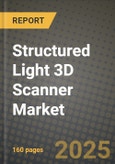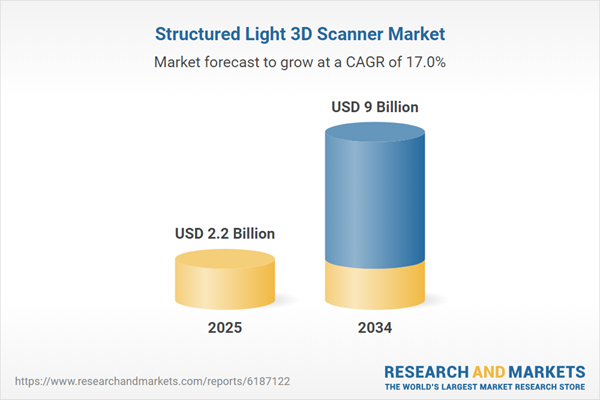The structured light 3D scanner market is a growing segment of the 3D scanning industry that leverages advanced technologies to capture highly accurate three-dimensional data from physical objects. Structured light 3D scanning uses a series of light patterns, typically projected onto a surface, and captures the deformation of these patterns to reconstruct a 3D model of the object. This technology is widely used in various industries, including automotive, aerospace, manufacturing, healthcare, and cultural heritage preservation. It offers several advantages, including high accuracy, fast scanning speeds, and non-contact measurement capabilities, making it ideal for applications that require precise object measurements and digital replicas. With the increasing demand for rapid prototyping, reverse engineering, and quality control, structured light 3D scanners are becoming indispensable tools across many sectors. As industries strive to adopt digital transformation technologies and improve production processes, the market for structured light 3D scanners is expected to continue growing. Additionally, advancements in computing power, sensor technology, and software have further enhanced the capabilities of these scanners, enabling more detailed and accurate 3D models for applications like additive manufacturing and virtual reality (VR).
The structured light 3D scanner market experienced significant advancements driven by ongoing technological innovations and increasing demand for high-quality 3D models across various industries. The automotive and aerospace industries, in particular, saw continued adoption of structured light 3D scanning for quality control, design verification, and rapid prototyping of complex components. The rise of Industry 4.0 and digital manufacturing processes also contributed to the growing use of 3D scanners for improving production efficiency and product accuracy. In addition, healthcare applications such as dental scanning and prosthetics design gained momentum, thanks to the ability of structured light scanners to produce detailed, high-resolution images. Furthermore, advancements in portable 3D scanning solutions allowed for easier and more flexible use in field applications, improving accessibility for industries requiring scanning of large or intricate objects. Another key development in 2024 was the integration of artificial intelligence (AI) and machine learning (ML) with 3D scanning systems, enabling automatic analysis and interpretation of scanned data. Despite these technological strides, challenges such as the high initial cost of structured light 3D scanners and the need for skilled professionals to operate them remained, slowing broader adoption in certain sectors.
The structured light 3D scanner market is expected to continue its growth trajectory, fueled by further advancements in scanning technology and expanding application areas. As industries increasingly adopt digital transformation and automation, the demand for precise and efficient 3D scanning solutions is expected to rise. Advancements in hardware, such as improved resolution, faster scanning speeds, and enhanced portability, will continue to make structured light 3D scanners more attractive for a wider range of applications, from industrial quality control to medical diagnostics. Additionally, the growing trend of integrating 3D scanning with additive manufacturing (3D printing) will further drive demand for high-accuracy 3D models. The rise of virtual and augmented reality technologies will also create new opportunities for the use of structured light 3D scanners in creating detailed, interactive 3D environments. As 3D scanning becomes more accessible, costs are expected to decrease, enabling smaller enterprises and emerging markets to adopt this technology. However, challenges such as the need for more standardization in 3D scanning processes and the integration of scanning systems with other industrial software solutions may persist, limiting the pace of adoption in certain areas.
Key Insights: Structured Light 3D Scanner Market
- Advancements in portability and ease of use, allowing for flexible 3D scanning in various field applications, particularly in industries like construction and archaeology.
- Integration of artificial intelligence (AI) and machine learning (ML) with 3D scanning technologies, enabling automatic data analysis and improved decision-making.
- Increased adoption of structured light 3D scanning in healthcare applications, including dental scanning, prosthetics design, and surgical planning.
- Growing demand for high-resolution and fast scanning technologies in automotive and aerospace industries for quality control and design verification.
- Expansion of structured light 3D scanning capabilities in virtual reality (VR) and augmented reality (AR) applications for creating detailed, interactive 3D models.
- The increasing demand for precision in design, manufacturing, and prototyping across industries like automotive, aerospace, and healthcare.
- The growth of digital transformation and Industry 4.0, pushing for the adoption of advanced scanning technologies to improve production efficiency and product accuracy.
- The rise of 3D printing and additive manufacturing, which requires highly accurate 3D models created by structured light scanning technologies.
- The growing use of virtual and augmented reality technologies, driving demand for 3D scanning solutions to create realistic, interactive digital environments.
- The high initial cost of structured light 3D scanners and the need for skilled professionals to operate them continue to present barriers to widespread adoption, particularly in smaller enterprises.
Structured Light 3D Scanner Market Segmentation
By Product
- Optical Scanner
- Structured Light Scanner
- Laser Scanner
By Range
- Short Range
- Medium Range
- Long Range
By Component
- Hardware
- Software
- Services
By Application
- Quality Control and Inspection
- Reverse Engineering
- Virtual Simulation
- Face Or Body Scanning
- Other Applications
By End Users
- Aerospace and Defense
- Healthcare
- Architecture and Construction
- Entertainment and Media
- Automotive
- Other End Users
Key Companies Analysed
- Carl Zeiss Optotechnik GmbH
- Hexagon AB
- Nikon Metrology NV
- Trimet
- 3D Digital Corporation
- FARO Technology Inc.
- GOM GmbH
- Creaform Inc.
- Shining 3D Tech
- Basis Software Inc.
- Perceptron Inc.
- Steinbichler Optotechnik GmbH
- Capture 3D
- Artec 3D
- Solutionix Corporation
- Kreon Technologies
- Breuckmann GmbH & Co. KG
- Exact Metrology
- Riegl Laser Measurement Systems
- EVA Optic
- ScanTech International Inc.
- ShapeGrabber Inc.
- RangeVision
- True Point Laser Scanning LLC
- Fuel 3D
Structured Light 3D Scanner Market Analytics
The report employs rigorous tools, including Porter’s Five Forces, value chain mapping, and scenario-based modeling, to assess supply-demand dynamics. Cross-sector influences from parent, derived, and substitute markets are evaluated to identify risks and opportunities. Trade and pricing analytics provide an up-to-date view of international flows, including leading exporters, importers, and regional price trends.Macroeconomic indicators, policy frameworks such as carbon pricing and energy security strategies, and evolving consumer behavior are considered in forecasting scenarios. Recent deal flows, partnerships, and technology innovations are incorporated to assess their impact on future market performance.
Structured Light 3D Scanner Market Competitive Intelligence
The competitive landscape is mapped through proprietary frameworks, profiling leading companies with details on business models, product portfolios, financial performance, and strategic initiatives. Key developments such as mergers & acquisitions, technology collaborations, investment inflows, and regional expansions are analyzed for their competitive impact. The report also identifies emerging players and innovative startups contributing to market disruption.Regional insights highlight the most promising investment destinations, regulatory landscapes, and evolving partnerships across energy and industrial corridors.
Countries Covered
- North America - Structured Light 3D Scanner market data and outlook to 2034
- United States
- Canada
- Mexico
- Europe - Structured Light 3D Scanner market data and outlook to 2034
- Germany
- United Kingdom
- France
- Italy
- Spain
- BeNeLux
- Russia
- Sweden
- Asia-Pacific - Structured Light 3D Scanner market data and outlook to 2034
- China
- Japan
- India
- South Korea
- Australia
- Indonesia
- Malaysia
- Vietnam
- Middle East and Africa - Structured Light 3D Scanner market data and outlook to 2034
- Saudi Arabia
- South Africa
- Iran
- UAE
- Egypt
- South and Central America - Structured Light 3D Scanner market data and outlook to 2034
- Brazil
- Argentina
- Chile
- Peru
Research Methodology
This study combines primary inputs from industry experts across the Structured Light 3D Scanner value chain with secondary data from associations, government publications, trade databases, and company disclosures. Proprietary modeling techniques, including data triangulation, statistical correlation, and scenario planning, are applied to deliver reliable market sizing and forecasting.Key Questions Addressed
- What is the current and forecast market size of the Structured Light 3D Scanner industry at global, regional, and country levels?
- Which types, applications, and technologies present the highest growth potential?
- How are supply chains adapting to geopolitical and economic shocks?
- What role do policy frameworks, trade flows, and sustainability targets play in shaping demand?
- Who are the leading players, and how are their strategies evolving in the face of global uncertainty?
- Which regional “hotspots” and customer segments will outpace the market, and what go-to-market and partnership models best support entry and expansion?
- Where are the most investable opportunities - across technology roadmaps, sustainability-linked innovation, and M&A - and what is the best segment to invest over the next 3-5 years?
Your Key Takeaways from the Structured Light 3D Scanner Market Report
- Global Structured Light 3D Scanner market size and growth projections (CAGR), 2024-2034
- Impact of Russia-Ukraine, Israel-Palestine, and Hamas conflicts on Structured Light 3D Scanner trade, costs, and supply chains
- Structured Light 3D Scanner market size, share, and outlook across 5 regions and 27 countries, 2023-2034
- Structured Light 3D Scanner market size, CAGR, and market share of key products, applications, and end-user verticals, 2023-2034
- Short- and long-term Structured Light 3D Scanner market trends, drivers, restraints, and opportunities
- Porter’s Five Forces analysis, technological developments, and Structured Light 3D Scanner supply chain analysis
- Structured Light 3D Scanner trade analysis, Structured Light 3D Scanner market price analysis, and Structured Light 3D Scanner supply/demand dynamics
- Profiles of 5 leading companies - overview, key strategies, financials, and products
- Latest Structured Light 3D Scanner market news and developments
Additional Support
With the purchase of this report, you will receive:- An updated PDF report and an MS Excel data workbook containing all market tables and figures for easy analysis.
- 7-day post-sale analyst support for clarifications and in-scope supplementary data, ensuring the deliverable aligns precisely with your requirements.
- Complimentary report update to incorporate the latest available data and the impact of recent market developments.
This product will be delivered within 1-3 business days.
Table of Contents
Companies Mentioned
- Carl Zeiss Optotechnik GmbH
- Hexagon AB
- Nikon Metrology NV
- Trimet
- 3D Digital Corporation
- FARO Technology Inc.
- GOM GmbH
- Creaform Inc.
- Shining 3D Tech
- Basis Software Inc.
- Perceptron Inc.
- Steinbichler Optotechnik GmbH
- Capture 3D
- Artec 3D
- Solutionix Corporation
- Kreon Technologies
- Breuckmann GmbH & Co. KG
- Exact Metrology
- Riegl Laser Measurement Systems
- EVA Optic
- ScanTech International Inc.
- ShapeGrabber Inc.
- RangeVision
- True Point Laser Scanning LLC
- Fuel 3D
Table Information
| Report Attribute | Details |
|---|---|
| No. of Pages | 160 |
| Published | October 2025 |
| Forecast Period | 2025 - 2034 |
| Estimated Market Value ( USD | $ 2.2 Billion |
| Forecasted Market Value ( USD | $ 9 Billion |
| Compound Annual Growth Rate | 16.9% |
| Regions Covered | Global |
| No. of Companies Mentioned | 25 |









